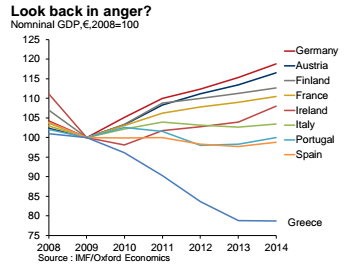
Dorothea Lange Crossroads grocery store and filling station, Yakima, Washington, Sumac Park 1939



Brussels has experince in this.
• Greece Accuses Europe Of Plotting Regime Change (AEP)
Greek premier Alexis Tsipras has accused Europe’s creditor powers of trying to subvert Greece’s elected government after five years of “pillaging”, warning in solemn terms that his country will defend its sovereign dignity whatever the consequences. The defiant stand came as the European Commission lashed out at the Greeks and warned that the country would collapse into a “state of emergency” unless there is a deal to avert a financial crash. Germany’s EU Commissioner Guenther Oettinger said the creditor powers must draw up urgent plans to cope with social unrest in Greece and a break-down of energy supplies and medicine as soon as July. In a terse statement, Mr Tsipras called on the EU institutions and the IMF to “adhere to realism”.
He accused the creditors of “political motives” for demanding further pension cuts, hinting that their real goal is to destroy the credibility of his radical-Left Syriza government and force regime change. “We are not only carrying a historical past underlined with struggles. We are carrying our people’s dignity as well as the aspirations of all Europeans. We cannot ignore this responsibility. It has to do with democracy,” he said. Germany’s Suddeutsche Zeitung reported that the creditors are drawing an ultimatum to the Greeks, threatening to cut off Greek access to the European payments system and forcing capital controls on the country as soon as this weekend. The plan would lead to the temporary closure of the banks, followed by a rationing of cash withdrawals.
Syriza sources have told the Telegraph that Greece may seek an injunction from the European Court of Justice to stop the creditors and the EU institutions acting in a way that breaches Greek treaty rights. This would be an unprecedented move, greatly complicating the picture. Equity markets fell across the Europe and bonds sold off sharply in the high-debt Latin states as investors start to think through the dramatic implications of a Greek default, followed by EMU rupture. “The Greek saga is finally reaching its climax, we think,” said Hans Redeker from Morgan Stanley. Yields on 10-year Portuguese bonds have jumped almost 170 basis points since their lows in March, reaching an eight-month high of 3.22pc. Spain’s yields have jumped by 120 points to 2.35pc.
While these levels are nothing like the panic spikes in past spasms of the EMU debt crisis, they are approaching levels that could soon tighten borrowing conditions for companies and mortgages. It may become harder for these countries to shake off deflation. Mario Draghi, the head of the European Central Bank, said the authorities could handle the immediate fall-out from a Greek default but refused to offer any further assurances. “The consequences in medium to long term to the Union is not something we are in a position to foresee,” he said.

“Why will creating money for Greece create inflation but not for Goldman Sachs, Citibank, and JPMorganChase?”
• Starvation Is The Price Greeks Will Pay For Remaining In The EU (PC Roberts)
Syriza, the new Greek government that intended to rescue Greece from austerity, has come a cropper. The government relied on the good will of its EU “partners,” only to find that its “partners” had no good will. The Greek government did not understand that the only concern was the bottom line, or profits, of those who held the Greek debt. The Greek people are as out to lunch as their government. The majority of Greeks want to remain in the EU even though it means that their pensions, their wages, their social services, and their employment opportunities will be reduced. Apparently for Greeks, being a part of Europe is worth being driven into the ground. The alleged “Greek crisis” makes no sense whatsoever.
It is obvious that Greece cannot with its devastated economy repay the debts that Goldman Sachs hid and then capitalized on the inside information, helping to cause the crisis. If the solvency of the holders of the Greek debt, apparently the NY hedge funds and German and Dutch banks, depends on being repaid, the ECB could just follow the example of the Federal Reserve and print the money to secure the Greek debt. The ECB is already printing 60 billion euros a month to save the European financial system, so why not include Greece? A conservative might say that such a course of action would cause inflation, but it hasn’t. The Fed has been creating money hands over fists for seven years, and according to the government there is no inflation.
We even have negative interest rates attesting to the absence of inflation. Why will creating money for Greece create inflation but not for Goldman Sachs, Citibank, and JPMorganChase? Obviously, the Western world doesn’t want to help Greece. The West wants to loot Greece. The deal is that Greece gets new loans with which to repay existing loans in exchange for selling municipal water companies to private investors (water rates will go up on the Greek people), for selling the state lottery to private investors (Greek government revenues drop, thus making debt repayment more difficult), and for other such “privatizations” such as selling the protected Greek islands to real estate developers. This is a good deal for everyone but Greece.

The eurozone sinks all boats.
• Not Just Greece, Everyone Should Leave The Euro -There’s No Point (Worstall)
If the 100,000 people of my native Bath all use different currencies then trade between the citizenry is going to be rather difficult. If we all use the same currency it will be easier and there will be more trade. Since trade is what gives us Smithian growth (from Adam Smith, the specialisation and division of labour and the trade in the resultant production), makes us all richer, this is a good idea. However, it’s possible to have too much of a good thing. If we’re using the same currency then we must, by definition, have the same monetary policy. And the larger the area we cover the more likely it is that we’ll have two more more areas within which it will react differently to an external or asymmetric shock (the definition of that second simply being a shock that hits different areas in different ways).
This is what Paul Krugman has been talking about with Finland and everyone has been talking about with respect to the property booms in Ireland and Spain a decade back. All of this is background: people have been chewing over how optimal the euro area is ever since the idea was first floated (hint: it’s not optimal). However, note that the size of that optimality depends upon the strength of the two effects. And if that increased trade effect is smaller then the optimal area becomes smaller. And what this most recent research seems to be showing is that there’s no extra trade effect at all:
“More importantly, we find that the trade effects of EMU are different from other currency unions. But, most disturbingly, we find that the precise econometric methodology used to estimate the currency effect on trade matters. A lot. In the large, we find no consistent evidence that EMU stimulated trade. Indeed, we are forced to conclude that econometric methodology matters so much that it undermines confidence in our ability to estimate the effect of currency union on trade.”
A reasonable rule of thumb is that if the effect you’re looking for varies a lot dependent upon the method you’re using to look for it (assuming that all the methods you are using are reasonable) then what you’re finding is not actually the effect, but variances due entirely to the measurement method. But even putting that aside they find that there’s a small through zero to possibly even negative effect upon trade of the currency union of the euro. Or, as we might put it, there’s no benefit and we’re left just with the costs. Things that cost us but have no benefit are things that we shouldn’t be doing. Thus, clearly, we shouldn’t be having the euro. Or, as we might put it, everyone should leave it, not just Greece.

“One doesn’t have to agree with the politics of the far left in Greece to vindicate the integrity of their economic case.”
• Why Greece Should Choose Eurozone Exit Rather Than Dependence (Irish Times)
The narrative of the euro zone crisis, the epicentre of which is Greece, has been airbrushed. Germany’s insistence that the 2012 bailout programme is a realistic reference point for current discussion is misconceived. Its assertion that debt relief can be discussed only after the completion of the current programme, rather than being the obvious starting point for a new agreement, is profoundly mistaken. The tenor of the euro zone’s criticism of the government of Alexis Tsipras has shifted from the patronising to the denunciatory, from faux long-suffering indulgence with a brash upstart to near visceral condemnation. The message is that the grown-ups are “exasperated” and “running out of patience” with Greece.
Germany’s minister for economic affairs, Sigmar Gabriel, argues that “Greece’s game theorists are gambling the future of their country. And Europe’s too.” This is revisionist rhetoric. Greece is more right than its critics. One doesn’t have to agree with the politics of the far left in Greece to vindicate the integrity of their economic case. What is true of a relationship is true also for a country: dependence is never healthy. Continued membership means continued dependence. Given the pressures being exerted on Greece, exit rather than dependence would be the better option. In February German finance minister Wolfgang Schäuble insisted that Greece complete the 2012 programme, regardless of the sea change in politics since then and the evidence that austerity was taking Greece further into recession.
He warned Athens not to question the framework of existing agreements or “everything is over”. It was a calamitous misjudgment. The “negotiations” have demonstrated how big countries behave when small countries step out of line and just how easily history can be rewritten. Tsipras, in an interview with Le Monde, said the euro zone’s dominant players were, by degrees, bringing about the “complete abolition of democracy in Europe” and were ushering in a technocratic monstrosity with powers to subjugate states that refuse to accept the “doctrines of extreme neoliberalism”.

So much for ‘we have it under control’.
• Contagion From Greek Crisis Engulfs Eurozone Bonds (Reuters)
Italian, Spanish and Portuguese bond yields leapt on Tuesday in one of the most serious episodes of contagion since the height of Europe’s debt crisis after the latest breakdown in talks between Greece and its creditors. Except for a jump in May during a global bond sell-off driven by improving inflation expectations, yields on bonds issued by the eurozone’s most vulnerable states were on track for their biggest three-day move since mid-2013. Similarly sharp moves were seen in 2012 as the crisis peaked, although yields on the three countries’ bonds remain far below the highs of above 7% hit in that period.
The moves, analysts say, could impact the dynamic of the negotiations between Greece and European leaders, who may have thought that the relative calm in markets during the protracted talks was a sign that investors thought a Grexit was manageable. “A lot of people, especially in Germany, have seemed relaxed about Greece. We’ve seen comments saying that if Greece exits it’s not such a big thing,” said Jean-Francois Robin, head of rates strategy at Natixis. “The market is just showing exactly the opposite of that.”

Sociopaths.
• Defiant Tsipras Accuses Creditors Of ‘Pillaging’ Greece (FT)
Alexis Tsipras, the Greek prime minister, vowed not to give in to demands made by his country’s international creditors, accusing them of “pillaging” Greece for the past five years and insisting it was now up to them to propose a new rescue plan to save Athens from bankruptcy. Mr Tsipras’ remarks came less than 24 hours after the collapse of last-ditch talks aimed at reaching agreement on the release of €7.2bn in desperately needed rescue funds. The comments were part of a chorus of defiance in Athens that left many senior EU officials convinced they can no longer clinch a deal with Greece to prevent it from crashing out of the eurozone.
Without a deal to release the final tranche of Greece’s current bailout, Athens is likely to default on a €1.5bn loan repayment due to be paid to the IMF in two weeks, an event officials fear would set off a financial chain reaction from which Greece would be unable to recover. “One can only suspect political motives behind the fact that [bailout negotiators] insist on further pension cuts, despite five years of pillaging,” Mr Tsipras said in a statement. “We are carrying our people’s dignity as well as the aspirations of all Europeans. We cannot ignore this responsibility. It is not a matter of ideological stubbornness. It has to do with democracy.”
Reflecting the growing fears of a Greek default, Günther Oettinger, Germany’s European commissioner, called for an “emergency plan, a ‘Plan B’” in case Athens failed to reach a deal, saying this would lead to “a state of emergency” in Greece, including difficulties paying for energy, police services and medicines. The growing signs of breakdown sent the Athens stock exchange down nearly 5% and borrowing costs on Greek bonds sharply higher. The jitters appeared to spread to other peripheral eurozone bonds as well, with sell-offs in benchmark Italian, Spanish and Portuguese debt.

It can. And should.
• Why Can’t Greece Just Declare Bankruptcy? (Stiglitz/Guzman)
Governments sometimes need to restructure their debts. Otherwise, a country’s economic and political stability may be threatened. But, in the absence of an international rule of law for resolving sovereign defaults, the world pays a higher price than it should for such restructurings. The result is a poorly functioning sovereign-debt market, marked by unnecessary strife and costly delays in addressing problems when they arise. We are reminded of this time and again. In Argentina, the authorities’ battles with a small number of “investors” (so-called vulture funds) jeopardized an entire debt restructuring agreed to — voluntarily — by an overwhelming majority of the country’s creditors.
In Greece, most of the “rescue” funds in the temporary “assistance” programs are allocated for payments to existing creditors, while the country is forced into austerity policies that have contributed mightily to a 25% decline in gross domestic product and have left its population worse off. In Ukraine, the potential political ramifications of sovereign-debt distress are enormous. So the question of how to manage sovereign-debt restructuring — to reduce debt to levels that are sustainable — is more pressing than ever. The current system puts excessive faith in the “virtues” of markets. Disputes are generally resolved not on the basis of rules that ensure fair resolution, but by bargaining among unequals, with the rich and powerful usually imposing their will on others.
The resulting outcomes are generally not only inequitable, but also inefficient. Those who claim that the system works well frame cases like Argentina as exceptions. Most of the time, they claim, the system does a good job. What they mean, of course, is that weak countries usually knuckle under. But at what cost to their citizens? How well do the restructurings work? Has the country been put on a sustainable debt path? Too often, because the defenders of the status quo do not ask these questions, one debt crisis is followed by another. Greece’s debt restructuring in 2012 is a case in point. The country played according to the “rules” of financial markets and managed to finalize the restructuring rapidly; but the agreement was a bad one and did not help the economy recover.
Three years later, Greece is in desperate need of a new restructuring. Distressed debtors need a fresh start. Excessive penalties lead to negative-sum games, in which the debtor cannot recover and creditors do not benefit from the larger repayment capacity that recovery would entail.

Note: Peston rarely has anything worth quoting. But even he can see something’s amiss in the Greece ‘debate’.
• Greece Isn’t Any Old Troubled Debtor (BBC)
it is not just the quantum of austerity that divides Athens from its creditors, it is also the method of execution. So the eurozone and IMF want further pension cuts and an increase in VAT on electricity. These measures are toxic for the Greek Syriza government because they are regressive, they disproportionately hurt the poorer Greeks who elected Syriza. So “why insist on pensions?”, says Blanchard. His answer is that pension expenditure in Greece is 16% of GDP, and “transfers from the budget to the pension system are close to 10% of GDP”. Now here in Britain we would think that public spending on pensions of close to a tenth of GDP is incredibly lavish: the equivalent figure for the UK, and indeed for most anglophone countries like the US and Canada, is much lower (at around 6% of GDP in Britain).
But in the UK, US and Canada, private pension saving is much higher than on the continent of Europe. And Greece’s government spending on pensions, as a share of GDP, is very much in the ballpark of spending in the rest of the eurozone: on the basis of the last official OECD figures, which admittedly are five years old, Greece spent less than Italy, France and Austria on pensions and only a bit more than Germany. And there is another thing: in 2009 the OECD calculated that Greek government cash spending on old-age and survivors benefits was 13% of its GDP. If the equivalent figure today is 10%, which is what Blanchard seems to suggest, that implies the outlay on pensions has already been reduced by around 40%, given that Greece’s GDP has shrunk by a quarter.
That said, on the basis of the last Eurostat figures, which are for 2012, Greece’s old-age outlay – including disability and incapacity payments – was considerably higher than the euro area average. So the stats are murky. But it is worth pointing out that Greece has proportionately more old people than the eurozone average, and more poor people (thanks to five years of slump). In other words, it is not obvious that there is outrageous excess in the Greek pension system (and there certainly isn’t in comparison with provision in Blanchard’s French home).
To state the obvious, which seems however to be lost on the leaders of the eurozone, once the euro is not forever for any member, it is not forever for all members. And once that clonking penny drops for global investors, the notion that the whole project will fall apart – not tomorrow, but one day – will increasingly become the default view.

“We should have fought for this from the start.”
• Ex-IMF Official Says ‘Errors’ By Lenders Worsened Greek Crisis (Kathimerini)
Greece’s former representative at the IMF, Panayiotis Roumeliotis, appeared before the parliamentary inquiry into the country’s debt and argued that Greece’s lenders have contributed to worsening the Greek crisis through the policies they advocated. “The mistake made by lenders is that they placed emphasis on the fiscal side and high taxes, which they are continuing to do now,” he said. “This resulted in the recession.” Roumeliotis was Greece’s envoy to the IMF when the first bailout was signed in 2010 and he claimed at the hearing that there was contact at the time between German and French officials to ensure that there would not be a restructuring of Greece debt as much of it was held by German and French banks. “They took too long to restructure Greece’s debt,” he said. “We should have fought for this from the start.”

Galbraith is Varoufakis’ friend and adviser he brought with him from texas.
• What Is Reform? The Strange Case Of Greece And Europe (James Galbraith)
On our way back from Berlin on Tuesday, Greek Finance Minister Yanis Varoufakis remarked to me that current usage of the word “reform” has its origins in the middle period of the Soviet Union, notably under Khrushchev, when modernizing academics sought to introduce elements of decentralization and market process into a sclerotic planning system. In those years when the American struggle was for rights and some young Europeans still dreamed of revolution, “reform” was not much used in the West. Today, in an odd twist of convergence, it has become the watchword of the ruling class.[..]
What is missing from the creditors’ demands is, well, reform. Cuts in pensions and VAT increases are not reform; they add nothing to economic activity or to competitiveness. Fire-sale privatization can lead to predatory private monopolies as anyone living in Latin America or Texas knows. Labor market deregulation is in the nature of an unethical experiment, the imposition of pain as therapy, something the internal records of the IMF as far back as 2010 confirm. No one can suggest that wage cuts can bring Greece into effective competition for jobs in traded goods with either Germany or Asia. Instead, what will happen is that anyone with competitive skills will leave. Reform in any true sense is a process that requires time, patience, planning, and money.
Pension reform and social insurance, modern labor rights, sensible privatizations and effective tax collection are reforms. So are measures relating to public administration, the justice system, tax enforcement, statistical integrity and other matters, which are agreed in principle and which the Greeks would implement readily if the creditors would permit it – but for negotiating reasons they do not. So would be an investment program emphasizing the advanced services Greece is well-suited to provide, including in health care, elder-care, higher education, research, and the arts. It requires recognizing that Greece cannot succeed by being the same as other countries; it must be different – a country with small shops, small hotels, high culture, and open beaches. A debt restructuring that would bring Greece back to the markets (and yes, that could be done, and the Greeks have a proposal to do it) would also be, on any reasonable reckoning, a reform.
The plain object of the creditors’ program is therefore not reform. It is the doubling-down on debt collection in the face of disaster. Pension cuts, wage cuts, tax increases and fire sales are offered up on the magical thought that the economy will recover despite the burden of higher taxes, lower purchasing power, and external repatriation of profits from privatization. The magic has already been tested for five years, with no success in the Greek case. That is why, instead of recovering as predicted after the bailout of 2010, Greece has suffered a loss of over 25% of its income with no end in sight. That is why the debt burden has gone from about 100% of GDP to 180%, when measured in terms of face values. But to admit this failure, in the case of Greece, would be to undermine the entire European policy project and the authority of those who run it.

Still a very well educated people.
• 3% of the World’s Top Scientists are Greek (Greek Reporter)
Greeks may be only 0.2% of the world population but 3% of top international scientists are of Greek nationality, says a survey. John Ioannidis, Professor of Medicine at Stanford University, conducted the research and presented it on Saturday at the Panhellenic Medical Conference in Athens. Ioannidis gave a lecture in memory of prominent Doctor and Professor Dimitris Trichopoulos who died in December 2014. The title was “The exodus of Greek scientists – a meta-analysis,” and the survey showed statistics for a total of 672 scientists with Greek names who have the most influence in the international scientific bibliography. The professor used statistical data from the Google Scholar database.
On average, the 672 Greek scientists have received 17,000 reports each in the international scientific bibliography. Only one in seven of them (14%) lived or live in Greece, 86% of them live abroad where several of them were born, and 33 of them have passed away. In the wider scientific community there are about 20 million authors who have made at least one scientific publication. Greek names represent about 1% of those, meaning 200,000, while Greek names represent 3% of all scientists. The most ancient Greek scientist, Aristotle, is constantly used as a reference in the scientific bibliography. Statistically, out of the 672 leading Greek scientists, only 95 (14%) are located in Greece.

How one can not be speechless after this 4 minute video is beyond us.
• Sunday Times ‘Reporter’ ‘Defends’ Snowden ‘Article’ (CNN)
CNN’s George Howell speaks with Sunday Times correspondent Tom Harper about reports that Russia and China have decrypted files stolen by NSA leaker Edward Snowden.

As its leadership promotes more of it.
• IMF: Inequality Hurts Economic Growth (Guardian)
The idea that increased income inequality makes economies more dynamic has been rejected by an IMF study, which shows that the widening income gap between rich and poor is bad for growth. A report by five IMF economists dismissed “trickle down” economics, and said that if governments want to increase the pace of growth they should concentrate on helping the poorest 20% of their citizens. The study, covering advanced, emerging and developing countries, said technological progress, weaker trade unions, globalisation and tax policies that favoured thewealthy had all played their part in making widening inequality “the defining challenge of our time”. The IMF report said the way income is distributed matters for growth.
“If the income share of the top 20% [the rich] increases, then GDP growth actually declines over the medium term, suggesting that the benefits do not trickle down. In contrast, an increase in the income share of the bottom 20% [the poor] is associated with higher GDP growth,” said the report. Echoing the frequent warnings about rising inequality from the Fund’s managing director Christine Lagarde, the report says governments around the world need to tackle the problem. It said: “Raising the income share of the poor, and ensuring that there is no hollowing-out of the middle class, is actually good for growth.” The study, however, reflects the tension between the IMF’s economic analysis and the harder-line policy advice given to individual countries, such as Greece, that need financial support.
During its negotiations with Athens, the IMF has been seeking to weaken worker rights, but the research paper found that the easing of labour market regulations was associated with greater inequality and a boost to the incomes of the richest 10%. “This result is consistent with forthcoming IMF work, which finds the weakening of unions is associated with a higher top 10% income share for a smaller sample of advanced economies,” said the study.

Guillotines must follow.
• 1% Of Households In 2014 Made Up 42% Of Total Private Global Wealth (Forbes)
The total number of millionaire households around the world reached a record 17.4 million in 2014, up 13.7% from 15.3 million the year before. Meanwhile, the ultra high net worth set is expected to grow at an equally impressive rate over the next five years. According to the Boston Consulting Group, wealth for the richest global families worth more than $100 million is projected to cross the $18 trillion mark by 2019. Currently, private wealth held by families with a fortune of more than $100 million total a combined $10 trillion, or roughly 6% of global wealth. Those ultra rich fortunes grew by 11% in 2014. To get to $18 trillion by 2019, the report predicts that household wealth will grow at a compound annual rate of about 12% in the next five years.
The report, published Monday, says there are more than 5,000 U.S. households worth $100 million or more. China follows with more than 1,000 ultra rich households. “This top segment is expected to be the fastest growing, in both the number of households and total wealth,” the reports’ authors wrote. In addition, the research shows that the top 1% of households in 2014 made up 42% of total private global wealth. Keep in mind, the survey only analyzes cash deposits, securities and life and pension plans. That means other big drivers of wealth like real estate, business ownership and collections aren’t included in the estimates.
Forbes’ own billionaires list, which analyzes all assets an individual can hold, counts 1,826 individuals from across the world with personal 10-figure fortunes, according to the World Billionaires list released in March. They controled an estimated $7.05 trillion at the time of the report. In the U.S. alone, Forbes estimates that there’s nearing 450 American billionaires. Many investors are “benefiting from the markets going up,” senior partner and wealth management expert Bruce Holley said at a Monday briefing. The amount of wealth held in equities rose to 64.1 trillion, up 17.5% from 2013, according to the report.

All over the Anglo world.
• Foreign Investors Pose Threat To US Residential Real Estate (MarketWatch)
U.S. real estate purchases by foreign nationals over a recent 12-month period totaled $92 billion. The negative impact of foreign investments in American residential real estate might have been badly overlooked by some U.S. government officials — and the potential harm it might cause is largely unknown to the average American. Reports from a variety of sources suggest that a housing recovery is taking place, though not at the pace expected. As of last month, it was still some 16% below its peak in 2008. Yet at the same time, some U.S. cities are experiencing an unusually high demand for residential real estate, with buyers outbidding each other, often by tens, and sometimes hundreds of thousands of dollars.
The same kind of outbidding was going on just prior to the 2007 real-estate crash where wealthy buyers, mostly foreign, were buying homes by paying for them in cash. Average American home owners, of whom one in three is on the verge of financial ruin, aren’t fueling such buying frenzies. Skyrocketing real-estate prices in America’s selected urban centers are likely the result of a foreign influx of cash, more particularly mainland Chinese money, which is now flooding major American cities in the billions of dollars. Last year, Bloomberg revealed a secret path that allows wealthy Chinese to transfer billions overseas. Before that, The Wall Street Journal outlined the questionable mechanics of moving cash out of China, where wealthy mainland Chinese bring their funds to Hong Kong and from there to other parts of the world.
Most of it ends up invested in favorite foreign destinations — namely the U.S., Australia, and Canada. Despite some Chinese banks across the border from Hong Kong allowing for a trial program (introduced in 2011) for overseas property purchases and emigration, the Bloomberg report noted that, “China’s foreign-exchange rules cap the maximum amount of yuan that individuals are allowed to convert at $50,000 each year and ban them from transferring the currency abroad directly.” So it’s illegal for mainland Chinese to take more than $50,000 out of the country — but wealthy Chinese are smuggling out billions. You can bet your last dollar that a good chunk of that Chinese money (of dubious origin) was earmarked for residential real-estate purchases, that is, the roofs over American heads.

Let ‘er rip.
• $112 Billion Fund Manager Worries Bond-Market Fire Doors Are Locked (Bloomberg)
If you haven’t realized by now that a lot of people are worried about bond-market liquidity, then I’m not sure why you’re bothering to read me. But in the hope that you’ll at least start taking an interest in where your pension fund is hanging out these days, maybe you’ll listen when a guy who manages $112 billion tells you that if bad things happen in bond land, the fire doors might turn out to be locked. Martin Gilbert runs Aberdeen Asset Management which, as previously mentioned, manages rather a lot of money. On Monday, he explained why he’s lined up a $500 million overdraft facility and has a further $1 billion of cash: “It will get ugly. You want bank lines in place in case you have to meet a redemption and there is no market.”
Let’s pause for a second to parse that sentence. Gilbert was talking about the risk of either Greece leaving the euro or the U.S. starting to raise borrowing costs. Either or both could spook investors, who in turn might ask Aberdeen for their money back. Except Aberdeen is concerned it might not be able to sell the things it bought with their money – so it would either have to deplete its cash to make the repayments, or borrow money to meet those redemptions. Setting aside a rainy day fund of $1.5 billion, just in case, is “a substantial amount but you’ve got to be prepared,” Gilbert said.
With the benefit of hindsight, I decided a while ago that the starting gun for the credit crunch was fired on Aug. 9, 2007. That day, BNP Paribas told investors it was freezing redemptions from three of its investment funds because it had decided there was no reliable way to determine the value of the assets in the funds, which in turn would make it impossible to sell things to repay investors. In other words, to echo Aberdeen’s Gilbert, there was no market.

Permanently.
• Fast Track Hands the Money Monopoly to Private Banks, Permanently (Ellen Brown)
On June 3, 2015, WikiLeaks released 17 key documents related to TiSA, which is considered perhaps the most important of the three deals being negotiated for “fast track” trade authority. The documents were supposed to remain classified for five years after being signed, displaying a level of secrecy that outstrips even the TPP’s four-year classification. TiSA involves 51 countries, including every advanced economy except the BRICS. The deal would liberalize global trade in services covering close to 80% of the US economy, including financial services, healthcare, education, engineering, telecommunications, and many more. It would restrict how governments can manage their public laws, and it could dismantle and privatize state-owned enterprises, turning those services over to the private sector.
Recall the secret plan devised by Wall Street and U.S. Treasury officials in the 1990s to open banking to the lucrative derivatives business. To pull this off required the relaxation of banking regulations not just in the US but globally, so that money would not flee to nations with safer banking laws. The vehicle used was the Financial Services Agreement concluded under the auspices of the World Trade Organization’s General Agreement on Trade in Services (GATS). The plan worked, and most countries were roped into this “liberalization” of their banking rules. The upshot was that the 2008 credit crisis took down not just the US economy but economies globally. TiSA picks up where the Financial Services Agreement left off, opening yet more doors for private banks and other commercial service industries, and slamming doors on governments that might consider opening their private banking sectors to public ownership.

What the f*ck is this? How much Mengele literature have these bozos been reading?
• CIA Torture Has Broken Spy Agency Rule On Human Experimentation (Guardian)
The Central Intelligence Agency had explicit guidelines for “human experimentation” before, during and after its post-9/11 torture of terrorism detainees, the Guardian has learned, which raise new questions about the limits on internal oversight over the agency’s in-house and contracted medical research. Sections of a previously classified CIA document, made public by the Guardian on Monday, empower the agency’s director to “approve, modify, or disapprove all proposals pertaining to human subject research”. The leeway provides the director, who has never in the agency’s history been a medical doctor, with significant influence over limitations the US government sets to preserve safe, humane and ethical procedures on people.
CIA director George Tenet approved abusive interrogation techniques, including waterboarding, designed by CIA contractor psychologists. He further instructed the agency’s health personnel to oversee the brutal interrogations – the beginning of years of controversy, still ongoing, about US torture as a violation of medical ethics. But the revelation of the guidelines has prompted critics of CIA torture to question how the agency could have ever implemented what it calls “enhanced interrogation techniques” – despite apparently having rules against “research on human subjects” without their informed consent.
Indeed, despite the lurid name, doctors, human-rights workers and intelligence experts consulted by the Guardian said the agency’s human-experimentation rules were consistent with responsible medical practices. The CIA, however, redacted one of the four subsections on human experimentation. “The more words you have, the more you can twist them, but it’s not a bad definition,” said Scott Allen, an internist and medical adviser to Physicians for Human Rights. The agency confirmed to the Guardian that the document was still in effect during the lifespan of the controversial rendition, detention and interrogation program.

Just on of the risks to pension funds.
• How Pension Funds Face Huge Risk From Climate Change (Guardian)
The pension funds of millions of people across the world, including teachers, public sector workers, health staff and academics in the UK and US, are heavily exposed to the plummeting coal sector, a Guardian analysis has revealed. It has also found that just a dozen people, including the owner of Chelsea FC, Roman Abramovich, own coal reserves equivalent to the annual carbon emissions of China, the world’s biggest polluter. The UN, which advocates a shift to clean energy, has more than $100m (£65m) invested in coal through its own pension fund. The Guardian examined the ownership of the biggest 50 publicly traded coal companies, ranked by the reserves held which in total are equivalent to more than 11 years of global emissions.
This alone could push the planet past beyond the 2C of climate change deemed dangerous by the world’s governments. A fast-growing, global fossil fuel divestment movement, backed by the Guardian’s Keep it in the Ground campaign, is having particular success in persuading investors to dump coal stocks. The world’s largest sovereign wealth fund, held by Norway, decided earlier this month to sell off more than $8bn of coal assets. The World Bank and the Bank of England have both warned that global action to cut carbon emissions could render fossil fuel reserves worthless, as analyses show most must remain in the ground. Coal, the most polluting fuel, is particularly at risk and investment bank Goldman Sachs declared in January the fuel had reached “retirement age”.
The coal price has crashed by 60% since 2011, as gas, renewable energy and climate policies have damaged demand. Tom Sanzillo, a former New York State comptroller who oversaw a $156bn pension fund, said: “Coal is arguably the worst performing sector in the whole world. Pension funds, which have a fiduciary duty to make money, have no business owning any of these companies. It is not a prospective risk, it is a now risk.” “The coal sector is falling into a financial death spiral,” said Mark Campanale, founder of the Carbon Tracker Initiative, which has pioneered analysis of the financial risks of fossil fuels. “The members of university, healthcare and UN pension funds are smart and informed people; they will be shocked to discover just how far exposed their funds are to coal investment risk.”

How hostile will Washington be when he visits later this year?
• Pope Warns Of Destruction Of World’s Ecosystem In Leaked Encyclical (Guardian)
Pope Francis will this week call for changes in lifestyles and energy consumption to avert the “unprecedented destruction of the ecosystem” before the end of this century, according to a leaked draft of a papal encyclical. In a document released by an Italian magazine on Monday, the pontiff will warn that failure to act would have “grave consequences for all of us”. Francis also called for a new global political authority tasked with “tackling … the reduction of pollution and the development of poor countries and regions”. His appeal echoed that of his predecessor, pope Benedict XVI, who in a 2009 encyclical proposed a kind of super-UN to deal with the world’s economic problems and injustices.
According to the lengthy draft, which was obtained and published by L’Espresso magazine, the Argentinean pope will align himself with the environmental movement and its objectives. While accepting that there may be some natural causes of global warming, the pope will also state that climate change is mostly a man-made problem. “Humanity is called to take note of the need for changes in lifestyle and changes in methods of production and consumption to combat this warming or at least the human causes that produce and accentuate it,” he wrote in the draft. “Numerous scientific studies indicate that the greater part of the global warming in recent decades is due to the great concentration of greenhouse gases … given off above all because of human activity.”
The pope will also single out those obstructing solutions. In an apparent reference to climate-change deniers, the draft states: “The attitudes that stand in the way of a solution, even among believers, range from negation of the problem, to indifference, to convenient resignation or blind faith in technical solutions.” The leak has frustrated the Vatican’s elaborate rollout of the encyclical on Thursday. Journalists were told they would be given an early copy on Thursday morning and that it would be released publicly at noon following a press conference. On Monday evening, the Vatican asked journalists not to publish details of the draft, emphasising that it was not the final text. A Vatican official said he believed the leak was an act of “sabotage against the pope”.
























